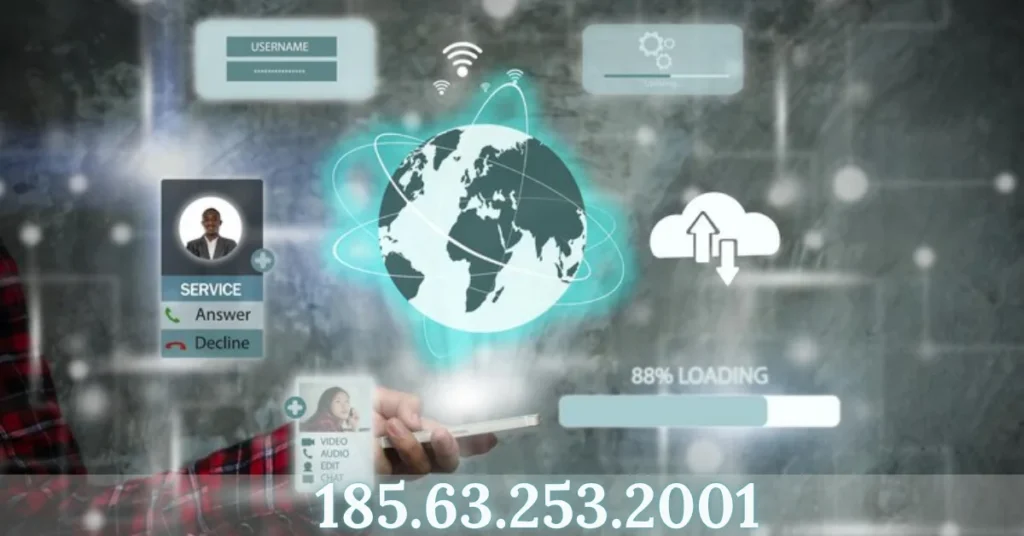Introduction to IP Addresses
In the vast digital landscape, every device connected to the internet has a unique identifier known as an IP address. These numerical labels play a crucial role in how data travels across networks, ensuring that information reaches its intended destination. Among the myriad of IP addresses out there, one stands out: 185.63.253.2001.
But what makes this particular IP address so intriguing? As we delve into its significance, you’ll discover not just what an IP address is and why it matters but also how 185.63.253.2001 fits into the grand scheme of things in our interconnected world. Get ready to unravel the mystery behind this unique identifier and understand its impact on your online experience!
What is an IP Address?
An IP address stands for Internet Protocol address. It serves as a unique identifier for devices on a network. Just like every house has its own mailing address, each device connected to the internet requires an IP address.
These addresses enable communication between computers and other devices across networks. When you send or receive data online, your device uses its IP address to ensure that information reaches the correct destination.
IP addresses come in two main types: IPv4 and IPv6. The former consists of four sets of numbers separated by dots, while the latter includes eight groups of alphanumeric characters divided by colons.
Understanding how IP addresses work is crucial for grasping the intricacies of digital interactions and online security measures. They play a vital role in everything from web browsing to email delivery.
The Function and Importance of IP Addresses
IP addresses serve as the backbone of internet communication. They act like digital postal addresses, ensuring that data travels to the right destination.
Every device connected to a network requires an IP address. This unique identifier helps routers and servers understand where to send information. Without it, online interactions would be chaotic.
Moreover, IP addresses enhance security measures. They allow systems to identify and block malicious traffic. Businesses rely on them for tracking user behavior and improving services.
In addition, they play a crucial role in geo-targeting content. Marketers use this information to tailor ads based on users’ locations.
Thus, understanding the function of IP addresses is essential for navigating today’s digital landscape effectively.
Understanding the Unique IP Address 185.63.253.2001
The unique IP address 185.63.253.2001 has specific characteristics that set it apart from others in its range. It belongs to a class of addresses known as public IPs, which are accessible over the internet.
This means devices using this IP can communicate directly with others worldwide without requiring additional routing or translation steps.
Geolocation tracing often reveals that such addresses have defined physical locations, allowing for tracking and analytics purposes.
Businesses and organizations frequently utilize unique IPs like 185.63.253.2001 for various reasons, including targeted advertising and user experience enhancements.
Understanding how this particular address functions is crucial for anyone involved in network management or cybersecurity efforts, as it may help identify potential vulnerabilities associated with online interactions or data transfers linked to it.
ALSO READ: Tiwzozmix458: Unlocking the Power of Digital Identifiers Today
How this IP Address is Different from Others?
The IP address 185.63.253.2001 stands out due to its specific numerical sequence and allocation. Unlike typical IPv4 addresses, which are often limited to four sets of numbers, this unique format hints at a broader categorization.
It may suggest a particular geographical region or organization that has registered it, giving insights into the location of servers or devices connected to the internet. This can help businesses target marketing efforts more effectively.
Moreover, unique IP addresses often carry distinct reputations within networks. They might be associated with certain behaviors online—whether benign or malicious—impacting how data security protocols respond.
Understanding this IP’s uniqueness is crucial for network administrators and cybersecurity professionals alike as they navigate potential threats while optimizing connectivity across various platforms.
Common Misconceptions about Unique IP Addresses
Many people believe that a unique IP address guarantees complete anonymity online. This is misleading. While a unique IP can identify a specific device, it doesn’t hide your digital footprint.
Another common misconception is that all unique IP addresses are static. In reality, some can be dynamic, changing periodically based on the network configuration or service provider policies.
Some users think that having a unique IP makes them immune to cyber threats. However, even with a distinct address, vulnerabilities still exist if proper security measures aren’t in place.
There’s the assumption that all unique IP addresses belong to individuals or private entities. Many are assigned to organizations and servers hosting websites or services rather than personal devices. Understanding these misconceptions helps clarify how we interact with technology today.
ALSO READ: Today S72E279: Your Guide to Understanding the Episode Code
Real-world Scenarios where Unique IP Addresses are Used
Unique IP addresses play a crucial role in various real-world applications. For instance, businesses often utilize them to ensure secure remote access for employees. Each worker can connect securely to the company’s network via their assigned IP address.
In online gaming, unique IPs help create dedicated servers. This ensures stable connections and an enhanced experience for players around the globe.
Additionally, content delivery networks (CDNs) use specific IP addresses to optimize data transfer speeds. By doing so, they tailor content based on user location while minimizing latency.
Moreover, law enforcement agencies track online activities through unique IP addresses linked to cybercrimes. This helps in identifying offenders and gathering evidence.
E-commerce platforms also rely on unique IPs for fraud detection systems. They analyze purchasing patterns tied to specific addresses as part of their security measures against fraudulent transactions.
Conclusion
Understanding the significance of a unique IP address like 185.63.253.2001 opens new dimensions in the digital landscape. It highlights not only how devices communicate but also emphasizes security and identity online.
As technology evolves, so does our reliance on these identifiers for seamless connectivity and interaction across networks. Recognizing how unique IP addresses function is essential not just for tech enthusiasts but for anyone navigating today’s internet.
Whether you’re a business owner or simply browsing from home, grasping the role of specific IP addresses can enhance your understanding of network dynamics and improve your overall online experience. The world of IP addresses continues to grow, making it crucial to stay informed about their implications in our digital lives.
ALSO READ: Alexander Farmiga: The Quiet Force Behind a Famous Surname
FAQs
What is 185.63.253.2001?
185.63.253.2001 is a unique IP address that may represent a specific device or server accessible on the internet for communication and data routing.
Why is this IP address considered unique?
Its numerical structure and allocation may indicate a dedicated server or specific organization, making it traceable and functionally distinct from dynamic IPs.
Can 185.63.253.2001 be linked to a physical location?
Yes IP addresses like this often reveal geolocation data which can identify the country region or ISP it is associated with.
Is 185.63.253.2001 safe to interact with online?
Not all IPs are inherently safe or unsafe; it’s important to verify their use context as some can be tied to legitimate services while others may be flagged for misuse.
How do businesses use unique IPs like 185.63.253.2001?
Businesses leverage unique IPs for server identification secure communications content delivery tracking analytics and improved user targeting.






